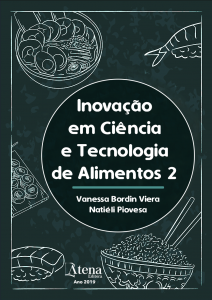
EFEITOS DE DIFERENTES MÉTODOS DE COCÇÃO NAS CARACTERÍSTICAS NUTRICIONAIS E FÍSICO-QUÍMICAS DE CENOURAS (Daucus carota L.) PRONTAS PARA CONSUMO
A demanda por alimentos prontos
para consumo está aumentando devido a
mudanças no estilo de vida da população que
mostram praticidade e conveniência. Manter
as propriedades dos alimentos vegetais é um
desafio, já que após a colheita ocorrem reações
biológicas, químicas e físicas e influenciam sua
qualidade. Além disso, a maioria dos vegetais
é comumente cozida antes do consumo. Sabese que a cocção induz alterações significativas
na composição química, influenciando
na concentração e biodisponibilidade de
compostos bioativos em hortaliças, podendo
gerar impactos positivos ou negativos,
considerando a mudança de nutrientes. As
condições de processamento podem causar
perdas de qualidade, que dependem do
método usado para conservação e do tipo
de vegetal. Embora estudos correlacionem
o processamento industrial e seus efeitos na
composição de alimentos, o conhecimento
desse assunto ainda é disperso e insuficiente.
Assim, diferentes tratamentos térmicos para
a conservação de cenouras prontas foram
estudados, e os impactos na qualidade destes
produtos termicamente processados foram
avaliados. Diferentes processos térmicos
foram testados: branqueamento a vapor (BV),
branqueamento por imersão (BI), sistema sous
vide (SV), pasteurização (PA) e esterilização
(ES) com variações de tempo e temperatura. As
perdas nutricionais foram avaliadas por análise
de vitamina C, carotenóides, composição
centesimal e parâmetros físico-químicos. Com
base nos resultados obtidos, o tratamento que
apresentou os resultados mais significativos na
manutenção das propriedades nutricionais e físico-químicas foi o sistema sous vide.
EFEITOS DE DIFERENTES MÉTODOS DE COCÇÃO NAS CARACTERÍSTICAS NUTRICIONAIS E FÍSICO-QUÍMICAS DE CENOURAS (Daucus carota L.) PRONTAS PARA CONSUMO
-
DOI: 10.22533/at.ed.99719091019
-
Palavras-chave: Cenoura pronta para consumo. Métodos de cozimento. Qualidade físico-química e nutricional.
-
Keywords: Carrot ready for consumption. Cooking methods. Physicochemical and nutritional quality.
-
Abstract:
Demand for ready-to-eat foods is increasing due to changes in the
lifestyle of the population that show practicality and convenience. Maintaining the
properties of plant foods is a challenge, since after harvesting biological, chemical and
physical reactions occur and influence their quality. Additionally, most vegetables are
commonly cooked before consumption. It is known that cooking induces significant
changes in chemical composition, influencing the concentration and bioavailability of
bioactive compounds in vegetables, and can generate positive or negative impacts,
considering the change in nutrients. Processing conditions can cause quality losses,
which depend on the method used for conservation and the type of vegetable. Although
studies correlate industrial processing and its effects on food composition, knowledge
of this subject is still scattered and insufficient. Thus, different heat treatments for
the conservation of ready-to-eat carrots were studied, and the impacts on the quality
of these thermally processed products were evaluated. Different thermal processes
were tested: steam bleaching (BV), immersion bleaching (BI), sous vide system
(SV), pasteurization (PA) and sterilization (ES) with time and temperature variations.
Nutritional losses were evaluated by analysis of vitamin C, carotenoids, centesimal
composition and physicochemical parameters. Based on the results obtained, the
treatment that presented the most significant results in maintaining the nutritional and
physicochemical properties was the sous vide system.
-
Número de páginas: 15
- Cauana Monique Haas
- Maria Eduarda Peretti
- Álvaro Vargas Junior
- Nei Fronza
- Sheila Mello da Silveira
- Fabiana Bortolini Foralosso


